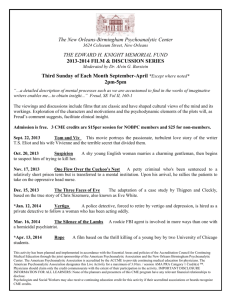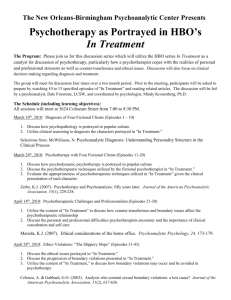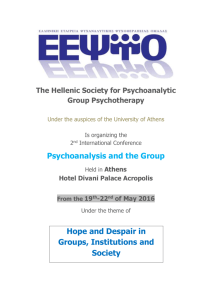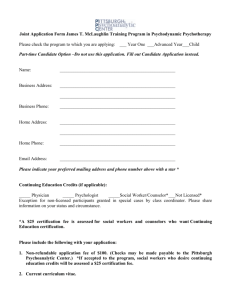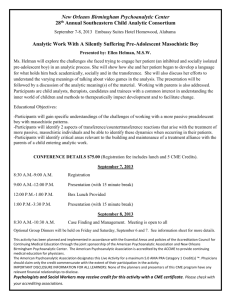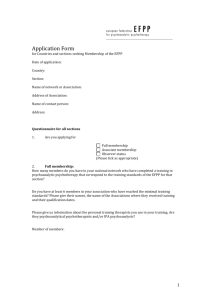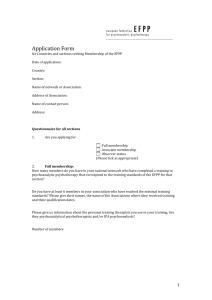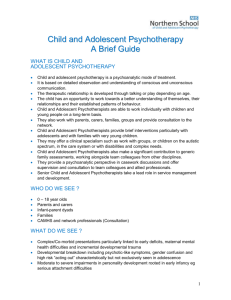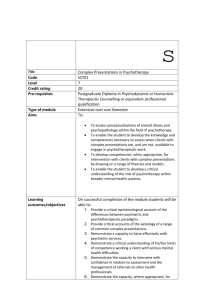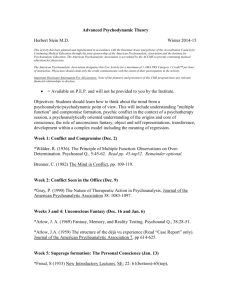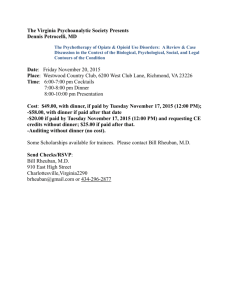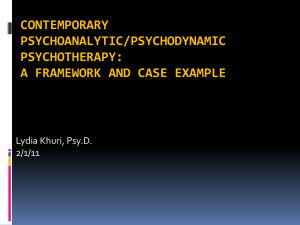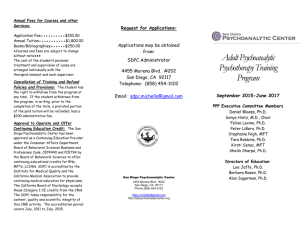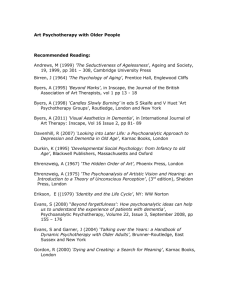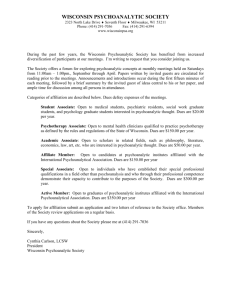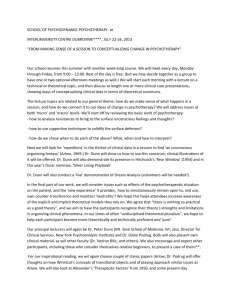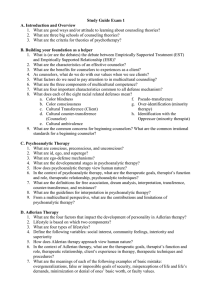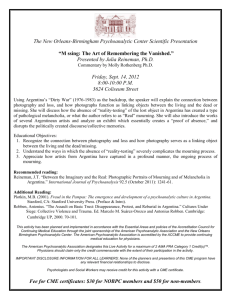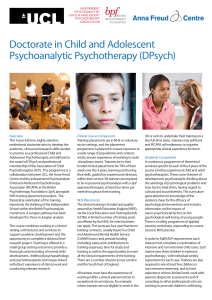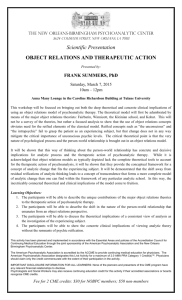Ethical Challenges in Conducting Child, Adolescent, and Adult
advertisement
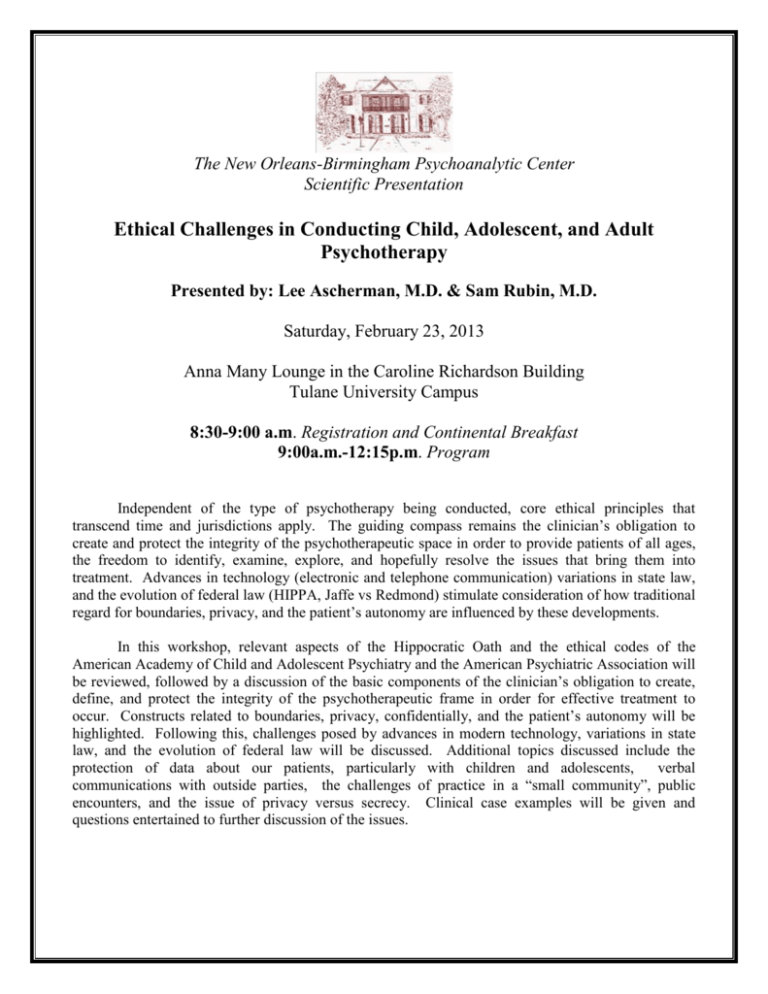
The New Orleans-Birmingham Psychoanalytic Center Scientific Presentation Ethical Challenges in Conducting Child, Adolescent, and Adult Psychotherapy Presented by: Lee Ascherman, M.D. & Sam Rubin, M.D. Saturday, February 23, 2013 Anna Many Lounge in the Caroline Richardson Building Tulane University Campus 8:30-9:00 a.m. Registration and Continental Breakfast 9:00a.m.-12:15p.m. Program Independent of the type of psychotherapy being conducted, core ethical principles that transcend time and jurisdictions apply. The guiding compass remains the clinician’s obligation to create and protect the integrity of the psychotherapeutic space in order to provide patients of all ages, the freedom to identify, examine, explore, and hopefully resolve the issues that bring them into treatment. Advances in technology (electronic and telephone communication) variations in state law, and the evolution of federal law (HIPPA, Jaffe vs Redmond) stimulate consideration of how traditional regard for boundaries, privacy, and the patient’s autonomy are influenced by these developments. In this workshop, relevant aspects of the Hippocratic Oath and the ethical codes of the American Academy of Child and Adolescent Psychiatry and the American Psychiatric Association will be reviewed, followed by a discussion of the basic components of the clinician’s obligation to create, define, and protect the integrity of the psychotherapeutic frame in order for effective treatment to occur. Constructs related to boundaries, privacy, confidentially, and the patient’s autonomy will be highlighted. Following this, challenges posed by advances in modern technology, variations in state law, and the evolution of federal law will be discussed. Additional topics discussed include the protection of data about our patients, particularly with children and adolescents, verbal communications with outside parties, the challenges of practice in a “small community”, public encounters, and the issue of privacy versus secrecy. Clinical case examples will be given and questions entertained to further discussion of the issues. Ethical Challenges in Conducting Child, Adolescent, and Adult Psychotherapy Upon completion, participants will be able to: 1. Increase their understanding of the ethical issues relevant to the modern practice of psychotherapy with children, adolescents, and adults. 2. Gain knowledge of federal law relevant to privacy and the challenges posed by modern technology in the protecting of privacy in the practice of psychotherapy. 3. Improve awareness of potential boundary violations in the conduct of psychotherapy with patients of all ages. Registration fees: $60 for Center members; $75 for non-members; $30 for college students (includes 3 hrs CME credit) Name _________________________________________ Address _____________ __________ Phone ________ _______________________________ _________________________________________________________ ____________________________________________________________________ ___________ _ Email Total enclosed $_______ Requesting continuing education credit? Yes / No Payment Option 1: Complete registration form and mail with check to: The New Orleans Birmingham Psychoanalytic Center 3624 Coliseum St. New Orleans, LA 70115 Payment Option 2: Go to our Paypal account and pay electronically! (more details will be added here) Parking: On Saturday, you may park on campus without a permit. There is street parking on Newcomb Place. In addition, you may park in the parking garage near The Reilly Center (McAlister Drive and Willow). This activity has been planned and implemented in accordance with the Essential Areas and policies of the Accreditation Council for Continuing Medical Education through the joint sponsorship of the American Psychoanalytic Association and the New Orleans Birmingham Psychoanalytic Center. The American Psychoanalytic Association is accredited by the ACCME to provide continuing medical education for physicians. The American Psychoanalytic Association designates this Live Activity for a maximum of 3 AMA PRA Category 1 Credits™. Physicians should claim only the credit commensurate with the extent of their participation in the activity. IMPORTANT DISCLOSURE INFORMATION FOR ALL LEARNERS: None of the planners and presenters of this CME program have any relevant financial relationships to disclose.. Psychologists and Social Workers may receive credit for this activity with a CME certificate.

